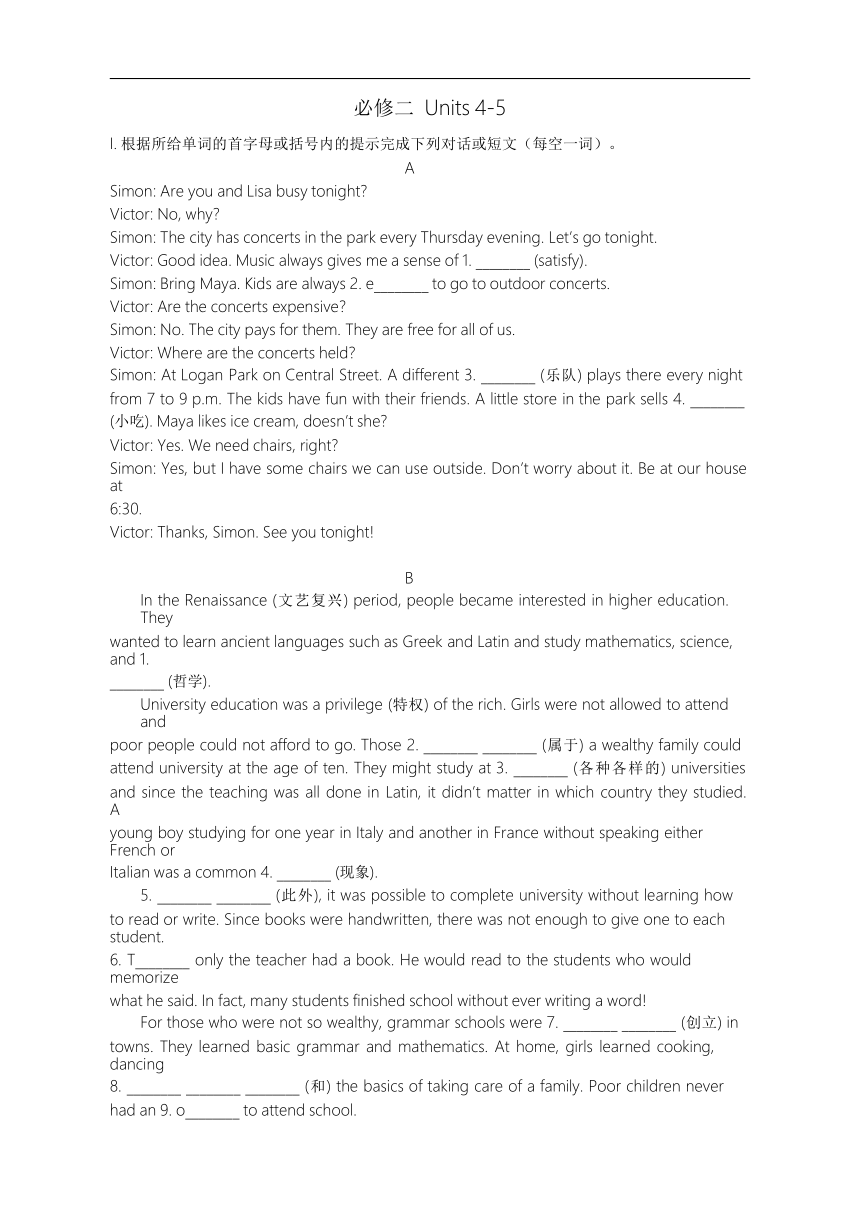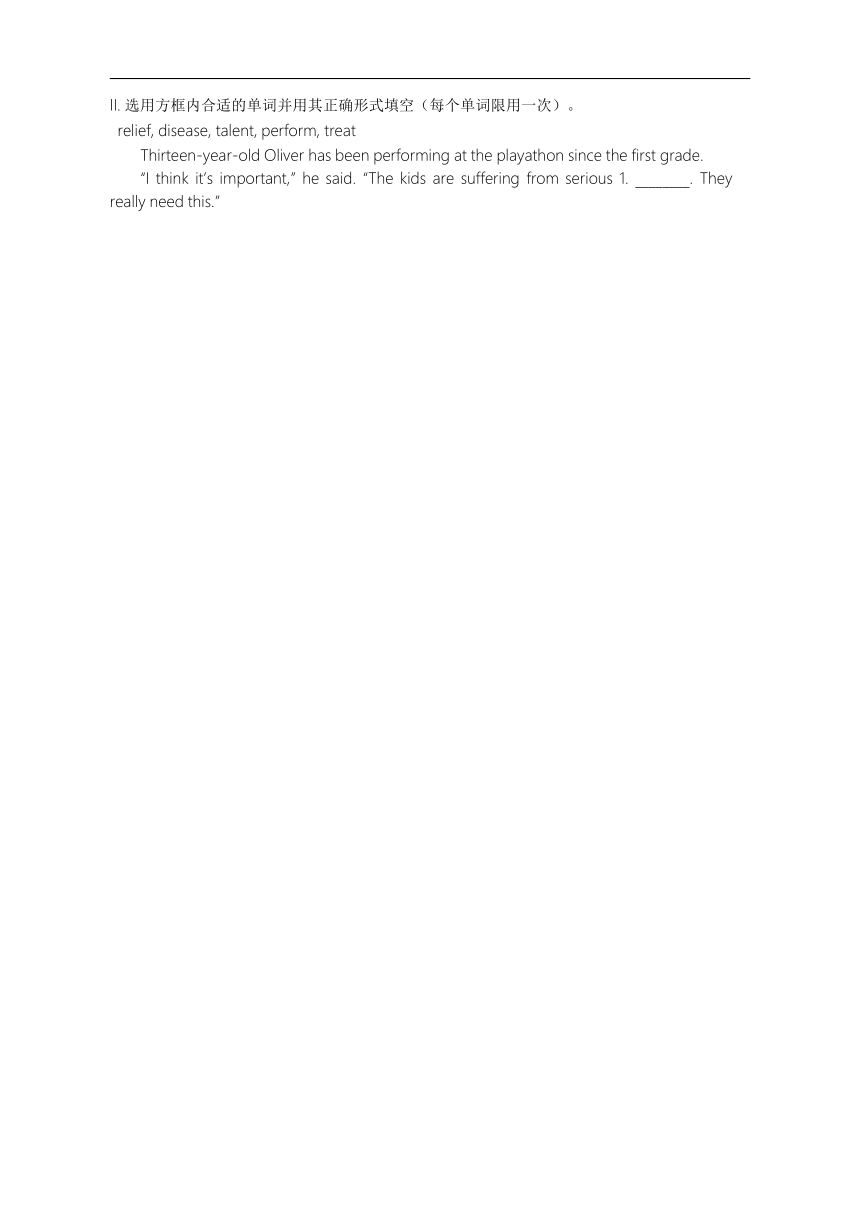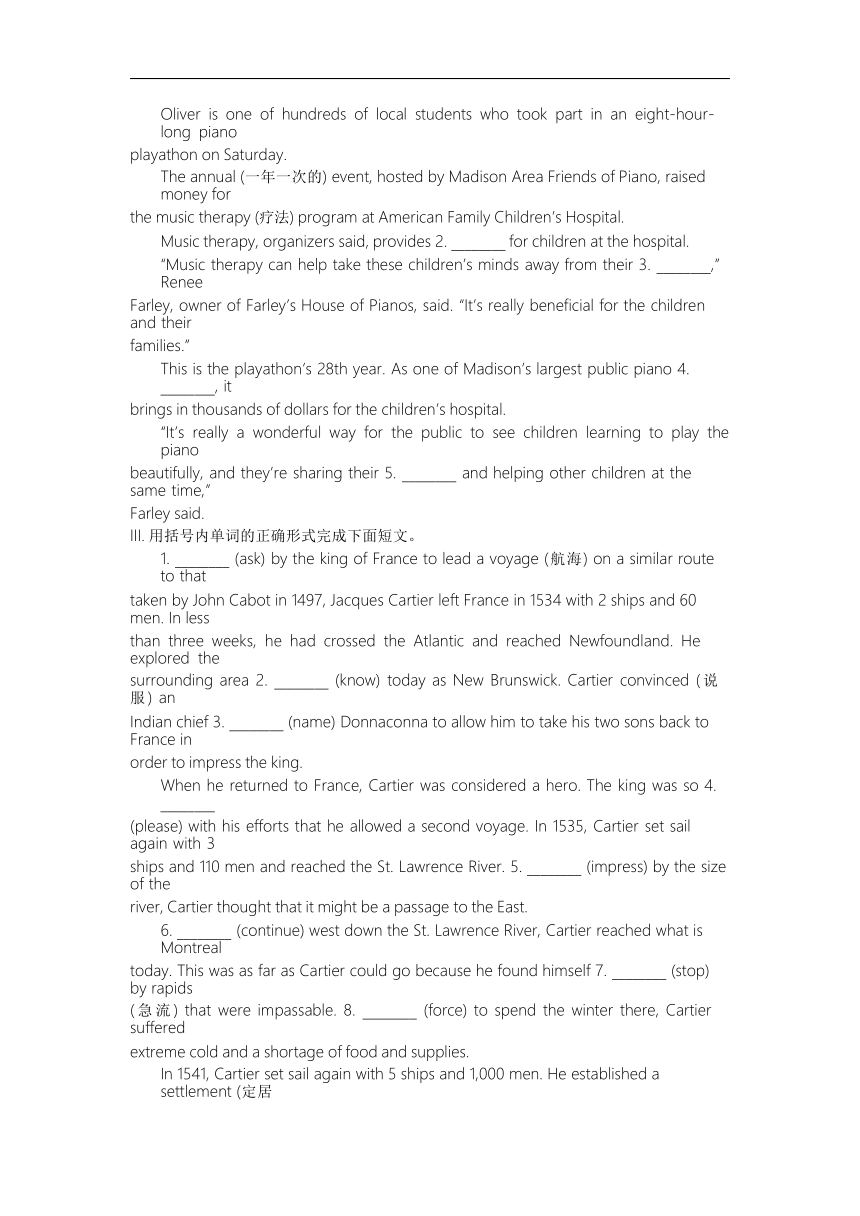人教版(2019)必修第二册:Unit4-5复习练习题(含答案)
文档属性
| 名称 | 人教版(2019)必修第二册:Unit4-5复习练习题(含答案) |  | |
| 格式 | doc | ||
| 文件大小 | 19.1MB | ||
| 资源类型 | 教案 | ||
| 版本资源 | 人教版(2019) | ||
| 科目 | 英语 | ||
| 更新时间 | 2021-12-16 21:59:53 | ||
图片预览




文档简介
必修二 Units 4-5
I. 根据所给单词的首字母或括号内的提示完成下列对话或短文(每空一词)。
A
Simon: Are you and Lisa busy tonight
Victor: No, why
Simon: The city has concerts in the park every Thursday evening. Let’s go tonight.
Victor: Good idea. Music always gives me a sense of 1. ________ (satisfy).
Simon: Bring Maya. Kids are always 2. e________ to go to outdoor concerts.
Victor: Are the concerts expensive
Simon: No. The city pays for them. They are free for all of us.
Victor: Where are the concerts held
Simon: At Logan Park on Central Street. A different 3. ________ (乐队) plays there every night
from 7 to 9 p.m. The kids have fun with their friends. A little store in the park sells 4. ________
(小吃). Maya likes ice cream, doesn’t she
Victor: Yes. We need chairs, right
Simon: Yes, but I have some chairs we can use outside. Don’t worry about it. Be at our house at
6:30.
Victor: Thanks, Simon. See you tonight!
B
In the Renaissance (文艺复兴) period, people became interested in higher education. They
wanted to learn ancient languages such as Greek and Latin and study mathematics, science, and 1.
________ (哲学).
University education was a privilege (特权) of the rich. Girls were not allowed to attend and
poor people could not afford to go. Those 2. ________ ________ (属于) a wealthy family could
attend university at the age of ten. They might study at 3. ________ (各种各样的) universities
and since the teaching was all done in Latin, it didn’t matter in which country they studied. A
young boy studying for one year in Italy and another in France without speaking either French or
Italian was a common 4. ________ (现象).
5. ________ ________ (此外), it was possible to complete university without learning how
to read or write. Since books were handwritten, there was not enough to give one to each student.
6. T________ only the teacher had a book. He would read to the students who would memorize
what he said. In fact, many students finished school without ever writing a word!
For those who were not so wealthy, grammar schools were 7. ________ ________ (创立) in
towns. They learned basic grammar and mathematics. At home, girls learned cooking, dancing
8. ________ ________ ________ (和) the basics of taking care of a family. Poor children never
had an 9. o________ to attend school.
II. 选用方框内合适的单词并用其正确形式填空(每个单词限用一次)。
relief, disease, talent, perform, treat
Thirteen-year-old Oliver has been performing at the playathon since the first grade.
“I think it’s important,” he said. “The kids are suffering from serious 1. ________. They
really need this.”
Oliver is one of hundreds of local students who took part in an eight-hour-long piano
playathon on Saturday.
The annual (一年一次的) event, hosted by Madison Area Friends of Piano, raised money for
the music therapy (疗法) program at American Family Children’s Hospital.
Music therapy, organizers said, provides 2. ________ for children at the hospital.
“Music therapy can help take these children’s minds away from their 3. ________,” Renee
Farley, owner of Farley’s House of Pianos, said. “It’s really beneficial for the children and their
families.”
This is the playathon’s 28th year. As one of Madison’s largest public piano 4. ________, it
brings in thousands of dollars for the children’s hospital.
“It’s really a wonderful way for the public to see children learning to play the piano
beautifully, and they’re sharing their 5. ________ and helping other children at the same time,”
Farley said.
III. 用括号内单词的正确形式完成下面短文。
1. ________ (ask) by the king of France to lead a voyage (航海) on a similar route to that
taken by John Cabot in 1497, Jacques Cartier left France in 1534 with 2 ships and 60 men. In less
than three weeks, he had crossed the Atlantic and reached Newfoundland. He explored the
surrounding area 2. ________ (know) today as New Brunswick. Cartier convinced ( 说 服 ) an
Indian chief 3. ________ (name) Donnaconna to allow him to take his two sons back to France in
order to impress the king.
When he returned to France, Cartier was considered a hero. The king was so 4. ________
(please) with his efforts that he allowed a second voyage. In 1535, Cartier set sail again with 3
ships and 110 men and reached the St. Lawrence River. 5. ________ (impress) by the size of the
river, Cartier thought that it might be a passage to the East.
6. ________ (continue) west down the St. Lawrence River, Cartier reached what is Montreal
today. This was as far as Cartier could go because he found himself 7. ________ (stop) by rapids
( 急 流 ) that were impassable. 8. ________ (force) to spend the winter there, Cartier suffered
extreme cold and a shortage of food and supplies.
In 1541, Cartier set sail again with 5 ships and 1,000 men. He established a settlement (定居
点) at present-day Quebec City. From there, he tried to find the kingdom of the Saguenay. He was
sure to fail because no kingdom existed.
The impact of Cartier’s explorations on Canadian history is important. In 1608, Champlain
established a settlement in Quebec City that became the beginning of the development of Canada
as a nation.
IV. 阅读下列短文,在空白处填入 1 个适当的单词或括号内单词的正确形式。
A
In ancient times, 1. ________ money was non-existent, people traded goods and services for
other goods and services that they needed. Items such as shells, metal, gold, jewelry and tools
were always welcome in a trade. In addition to simply 2. ________ (trade) goods and services, a
simple form of currency 3. ________ (establish).
In Africa and Asia, shells were used as currency while in North America, the Indians used
necklaces and headdresses 4. ________ place of money. In Central Africa, copper rods (铜棒), 5.
________ (call) congas, were used as currency. Metal miniatures (缩小物) were used to buy the
actual things they stood for. For example, a miniature of a tool would be used to buy that exact
tool. 6. ________ (probable) the most popular form of currency was the use of animals. Cattle and
pigs are still used today to buy products in some 7. ________ (area) in Asia.
With the development of cities, standard forms of currency became necessary. The barter (物
物 交 换 ) method worked nicely between individuals or in a village setting, but there was no
standard by which a person could measure the value of 8. ________ they were buying. It was
difficult 9. ________ (be) sure that the deal was fair. So it was necessary to establish a(n) 10.
________ (effect) system. This marked the beginning of money as we know it today.
B
Franz Joseph Haydn was born in the Austrian village of Rohrau. His childhood was a(n)
1. ________ (extreme) musical one, often singing together with family and neighbors. When
Haydn was very young, his parents recognized 2. ________ (they) son’s musical talent and
accepted an offer to allow schoolmaster and choirmaster Johann Matthias Franck 3. ________
(train) young Haydn as a musician.
In his teens Franz began working as a freelance (自由职业的) musician and composing when
he had time. His big break came when he 4. ________ (offer) the position of court conductor for
Prince Esterhazy. Haydn worked for the prince for 30 years 5. ________ (write) many symphonies
and other works.
When the prince died Haydn 6. ________ (decide) to travel to London. When he arrived, he
discovered 7. ________ he was a famous composer there with many of his compositions being
performed and sold as sheet music for many years.
8. ________ May 31, 1809, Haydn died a happy man and a beloved composer. Considered to
be one of the 9. ________ (great) composers of the classical era, he is referred to 10. ________
the “Father of the String Quartet (弦乐四重奏)” and the “Father of the Symphony”.
答案
I.
A
1. satisfaction 2. eager
3. band 4. snacks
B
1. philosophy 2. belonging to
3. various 4. phenomenon
5. In addition 6. Thus
7. set up 8. as well as
9. opportunity
II.
1. diseases 2. relief
3. treatment 4. performances
5. talents
III.
1. Asked 2. known
3. named 4. pleased
5. Impressed 6. Continuing
7. stopped 8. Forced
IV.
A
1. when 2. trading
3. was established 4. in
5. called 6. Probably
7. areas 8. what
9. to be 10. effective
B
1. extremely 2. their
3. to train 4. was offered
5. writing 6. decided
7. that 8. On
9. greatest 10. as
I. 根据所给单词的首字母或括号内的提示完成下列对话或短文(每空一词)。
A
Simon: Are you and Lisa busy tonight
Victor: No, why
Simon: The city has concerts in the park every Thursday evening. Let’s go tonight.
Victor: Good idea. Music always gives me a sense of 1. ________ (satisfy).
Simon: Bring Maya. Kids are always 2. e________ to go to outdoor concerts.
Victor: Are the concerts expensive
Simon: No. The city pays for them. They are free for all of us.
Victor: Where are the concerts held
Simon: At Logan Park on Central Street. A different 3. ________ (乐队) plays there every night
from 7 to 9 p.m. The kids have fun with their friends. A little store in the park sells 4. ________
(小吃). Maya likes ice cream, doesn’t she
Victor: Yes. We need chairs, right
Simon: Yes, but I have some chairs we can use outside. Don’t worry about it. Be at our house at
6:30.
Victor: Thanks, Simon. See you tonight!
B
In the Renaissance (文艺复兴) period, people became interested in higher education. They
wanted to learn ancient languages such as Greek and Latin and study mathematics, science, and 1.
________ (哲学).
University education was a privilege (特权) of the rich. Girls were not allowed to attend and
poor people could not afford to go. Those 2. ________ ________ (属于) a wealthy family could
attend university at the age of ten. They might study at 3. ________ (各种各样的) universities
and since the teaching was all done in Latin, it didn’t matter in which country they studied. A
young boy studying for one year in Italy and another in France without speaking either French or
Italian was a common 4. ________ (现象).
5. ________ ________ (此外), it was possible to complete university without learning how
to read or write. Since books were handwritten, there was not enough to give one to each student.
6. T________ only the teacher had a book. He would read to the students who would memorize
what he said. In fact, many students finished school without ever writing a word!
For those who were not so wealthy, grammar schools were 7. ________ ________ (创立) in
towns. They learned basic grammar and mathematics. At home, girls learned cooking, dancing
8. ________ ________ ________ (和) the basics of taking care of a family. Poor children never
had an 9. o________ to attend school.
II. 选用方框内合适的单词并用其正确形式填空(每个单词限用一次)。
relief, disease, talent, perform, treat
Thirteen-year-old Oliver has been performing at the playathon since the first grade.
“I think it’s important,” he said. “The kids are suffering from serious 1. ________. They
really need this.”
Oliver is one of hundreds of local students who took part in an eight-hour-long piano
playathon on Saturday.
The annual (一年一次的) event, hosted by Madison Area Friends of Piano, raised money for
the music therapy (疗法) program at American Family Children’s Hospital.
Music therapy, organizers said, provides 2. ________ for children at the hospital.
“Music therapy can help take these children’s minds away from their 3. ________,” Renee
Farley, owner of Farley’s House of Pianos, said. “It’s really beneficial for the children and their
families.”
This is the playathon’s 28th year. As one of Madison’s largest public piano 4. ________, it
brings in thousands of dollars for the children’s hospital.
“It’s really a wonderful way for the public to see children learning to play the piano
beautifully, and they’re sharing their 5. ________ and helping other children at the same time,”
Farley said.
III. 用括号内单词的正确形式完成下面短文。
1. ________ (ask) by the king of France to lead a voyage (航海) on a similar route to that
taken by John Cabot in 1497, Jacques Cartier left France in 1534 with 2 ships and 60 men. In less
than three weeks, he had crossed the Atlantic and reached Newfoundland. He explored the
surrounding area 2. ________ (know) today as New Brunswick. Cartier convinced ( 说 服 ) an
Indian chief 3. ________ (name) Donnaconna to allow him to take his two sons back to France in
order to impress the king.
When he returned to France, Cartier was considered a hero. The king was so 4. ________
(please) with his efforts that he allowed a second voyage. In 1535, Cartier set sail again with 3
ships and 110 men and reached the St. Lawrence River. 5. ________ (impress) by the size of the
river, Cartier thought that it might be a passage to the East.
6. ________ (continue) west down the St. Lawrence River, Cartier reached what is Montreal
today. This was as far as Cartier could go because he found himself 7. ________ (stop) by rapids
( 急 流 ) that were impassable. 8. ________ (force) to spend the winter there, Cartier suffered
extreme cold and a shortage of food and supplies.
In 1541, Cartier set sail again with 5 ships and 1,000 men. He established a settlement (定居
点) at present-day Quebec City. From there, he tried to find the kingdom of the Saguenay. He was
sure to fail because no kingdom existed.
The impact of Cartier’s explorations on Canadian history is important. In 1608, Champlain
established a settlement in Quebec City that became the beginning of the development of Canada
as a nation.
IV. 阅读下列短文,在空白处填入 1 个适当的单词或括号内单词的正确形式。
A
In ancient times, 1. ________ money was non-existent, people traded goods and services for
other goods and services that they needed. Items such as shells, metal, gold, jewelry and tools
were always welcome in a trade. In addition to simply 2. ________ (trade) goods and services, a
simple form of currency 3. ________ (establish).
In Africa and Asia, shells were used as currency while in North America, the Indians used
necklaces and headdresses 4. ________ place of money. In Central Africa, copper rods (铜棒), 5.
________ (call) congas, were used as currency. Metal miniatures (缩小物) were used to buy the
actual things they stood for. For example, a miniature of a tool would be used to buy that exact
tool. 6. ________ (probable) the most popular form of currency was the use of animals. Cattle and
pigs are still used today to buy products in some 7. ________ (area) in Asia.
With the development of cities, standard forms of currency became necessary. The barter (物
物 交 换 ) method worked nicely between individuals or in a village setting, but there was no
standard by which a person could measure the value of 8. ________ they were buying. It was
difficult 9. ________ (be) sure that the deal was fair. So it was necessary to establish a(n) 10.
________ (effect) system. This marked the beginning of money as we know it today.
B
Franz Joseph Haydn was born in the Austrian village of Rohrau. His childhood was a(n)
1. ________ (extreme) musical one, often singing together with family and neighbors. When
Haydn was very young, his parents recognized 2. ________ (they) son’s musical talent and
accepted an offer to allow schoolmaster and choirmaster Johann Matthias Franck 3. ________
(train) young Haydn as a musician.
In his teens Franz began working as a freelance (自由职业的) musician and composing when
he had time. His big break came when he 4. ________ (offer) the position of court conductor for
Prince Esterhazy. Haydn worked for the prince for 30 years 5. ________ (write) many symphonies
and other works.
When the prince died Haydn 6. ________ (decide) to travel to London. When he arrived, he
discovered 7. ________ he was a famous composer there with many of his compositions being
performed and sold as sheet music for many years.
8. ________ May 31, 1809, Haydn died a happy man and a beloved composer. Considered to
be one of the 9. ________ (great) composers of the classical era, he is referred to 10. ________
the “Father of the String Quartet (弦乐四重奏)” and the “Father of the Symphony”.
答案
I.
A
1. satisfaction 2. eager
3. band 4. snacks
B
1. philosophy 2. belonging to
3. various 4. phenomenon
5. In addition 6. Thus
7. set up 8. as well as
9. opportunity
II.
1. diseases 2. relief
3. treatment 4. performances
5. talents
III.
1. Asked 2. known
3. named 4. pleased
5. Impressed 6. Continuing
7. stopped 8. Forced
IV.
A
1. when 2. trading
3. was established 4. in
5. called 6. Probably
7. areas 8. what
9. to be 10. effective
B
1. extremely 2. their
3. to train 4. was offered
5. writing 6. decided
7. that 8. On
9. greatest 10. as
